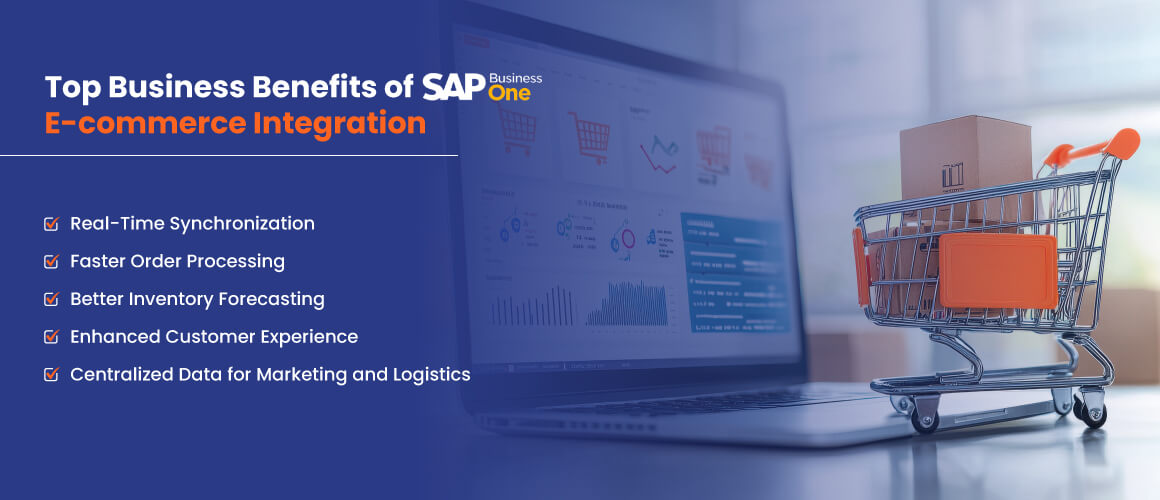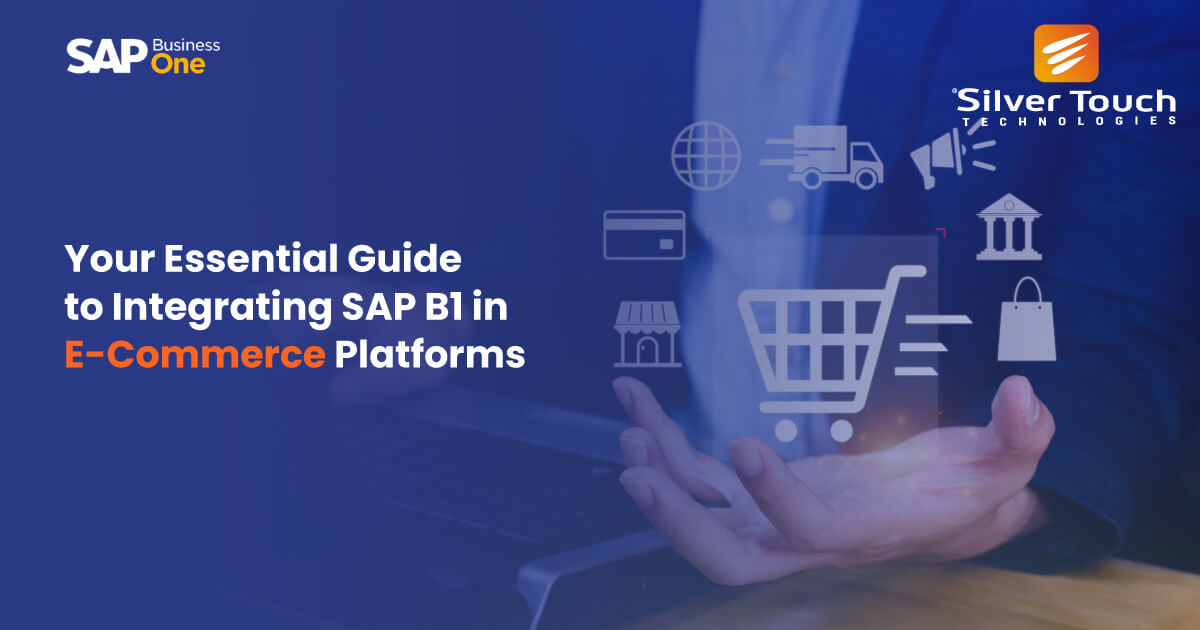The e-commerce business has gained prominence, especially during and after the pandemic era. These days, people prefer to give orders on the move using their smartphones and get products delivered to selected places. However, this expectation has made the retailer’s life more difficult than ever. Thankfully, ERP integration with e-commerce platforms can help them serve this purpose.
An ERP for retail industry offers many benefits to retailers. Let’s understand a hypothetical scenario with an example of a robust ERP solution, SAP Business One. It has all the modules necessary to handle small and mid-sized enterprises. The thriving e-commerce sector can leverage the benefits of this ERP solution with SAP B1 e-commerce integration.
This post talks about the benefits, challenges, and best practices of SAP Business One e-commerce integration. Let’s start with the key benefits this combination can offer to retailers worldwide.
Top Business Benefits of SAP B1 – E-commerce Integration
Integrating SAP Business One with your existing e-commerce platform can transform your business operations and improve customer satisfaction. Here we mention some key benefits of SAP B1 e-commerce integration-

Real-Time Synchronization
The first and foremost benefit of this combination is it offers real-time sync of inventory, orders, pricing, and customer data. For example, whenever a change in any of these factors occurs, the entire information gets updated and reflected in the other system. This synchronization ensures consistency in data and eliminates discrepancies while maintaining accuracy in financial records.
Faster Order Processing
Retailers can get rid of manually entering online orders from an e-commerce platform into SAP Business One after integration. This automation can increase the speed and efficiency of the order fulfillment process. It can also reduce the chances of human errors and save a lot of time for retailers or e-commerce business staff.
Better Inventory Forecasting
SAP B1 can consolidate all sales data (both online and offline), returns, and purchase orders in real-time. It can give a holistic view to retailers after having proper ERP integration with e-commerce platforms. Moreover, retailers can manage their supply chains more efficiently with the help of SAP Business One in their online stores.
Enhanced Customer Experience
Accuracy and transparency are keys to pleasing customers when they shop online. As SAP Business One e-commerce integration ensures that whatever customers see on the website regarding the shipping status, the same they can also see on smartphones. This can increase trust from the availability perspective and confidence from the timely delivery aspect.
Centralized Data for Marketing and Logistics
This integration assists retailers in finding data from disparate systems. A single, unified repository within SAP Business One can save sales, marketing, and logistics data with inventory levels and financial transactions. It is useful for running targeted marketing campaigns and optimizing the logistics process. Retailers can establish seamless collaboration with the help of a centralized data system.
SAP Business One ERP solutions can take an e-commerce business to a new level by integrating into different popular platforms like Magento and Shopify. Let’s have an overview of the supported platforms for SAP Business One.
Popular E-commerce Platforms Supported
All the popular e-commerce platforms support ERP solutions. E-Commerce ERP integration can boost your online business in several ways. It is interesting to make a list of popular e-commerce platforms that support ERP.
Magento (Adobe Commerce)
This open-source, highly flexible, and feature-rich e-commerce platform offers extensive customization capabilities. It has robust built-in tools for managing large product catalogs, and mid to large-sized enterprises or brands can use it. This platform needs significant technical expertise for the integration and maintenance of the ERP system.
Shopify
This highly user-friendly and cloud-based e-commerce platform can simplify the process of establishing and managing an online store. It has an extensive app marketplace with a wide range of themes. SMBs, startups, and DTC (Direct-to-consumer) brands can get a robust online store with the help of this platform. Shopify Plus is ideal for larger businesses.
WooCommerce
This is a free and open-source plugin for an e-commerce website. It can transform a WordPress website into a fully functional online store. Bloggers and content creators who add e-commerce functionality to their websites can use this plugin. Moreover, SMBs and existing WordPress users find this plugin highly useful to grow their business cost-effectively.
BigCommerce
It is a SaaS (Software as a Service) e-commerce platform that offers a scalable and feature-rich online store. It focuses on robust APIs for integration and offers strong support for B2B and omnichannel selling. A feature-rich ERP can give an excellent omnichannel retail experience with this platform. BigCommerce is useful for growing businesses and enterprise-level companies.
PrestaShop
It is a free and open-source e-commerce solution that enables small to medium-sized businesses to get a customizable online store. Extensive features and customization options with a large community make PrestaShop one of the preferred e-commerce platforms. PrestaShop offers a balance of features and flexibility to online retailers.
Let’s understand how SAP B1 can be integrated with each of these platforms.
How SAP Business One Integrates with Each Platform
SAP Business One ERP solution requires integration approaches like API-based integration, pre-built connectors, and notable SAP-Certified connectors. Let’s get a brief idea of all these ways.
API-based Integration
This method involves the process of building custom connections between SAP B1 and the e-commerce platform directly using their respective APIs (Application Programming Interfaces). It offers more scalability and an easier way to integrate SAP B1 into the platform.
Pre-built Connectors
Some off-the-shelf software solutions are available that can integrate SAP B1 with a specific e-commerce platform. It offers pre-defined data flows and a more guided setup. However, it is difficult to customize or maintain this integration in the future.
Custom Middleware Solutions
This approach is about using a separate and highly robust integration platform or middleware as an intermediary between SAP B1 and an e-commerce platform. These solutions act as a centralized hub for managing data flows and offer ease of integration.
Notable SAP-certified Connectors for Each Platform
SAP-Certified connectors are available for all popular e-commerce platforms. Magento has Webkul, Shopify has APPSeCONNECT, WooCommerce has Webkul, and BigCommerce or PrestaShop have pre-built connectors available.
It is fair to mention that e-commerce companies need to choose the right ERP solution provider to make the integration successful.
SAP B1- E-Commerce Integration Challenges
SAP B1-E-Commerce integration is a complex process and brings some hurdles. Here we mention some of these challenges in brief-
Data Inconsistencies
When data attributes like pricing rules or customer IDs are not uniformly defined between SAP B1 and the respective e-commerce platform, this challenge arises.
Real-time Syncing Complexities
It is technically challenging to achieve true real-time synchronization, especially for high-volume transactions, due to changing API limitations and network legacy.
Customization Requirements
Many online stores have unique operational workflows that are out of range for either SAP Business One or a particular e-commerce platform. This can make customization difficult.
Dependency on Third-party Connectors
It is a big limitation and hurdle to rely on pre-built connectors. It can reduce flexibility and cause issues, especially if the vendor discontinues support for the third-party connector.
Downtime or Performance Issues
This can be the most common issue, especially when there is a lack of proper planning and mistakes in execution. This can lead to system slowdowns or even downtime.
A reputed ERP solutions provider with vast experience working with popular e-commerce platforms can implement best practices to overcome these challenges.
Best Practices for Successful Integration
An effective ERP integration with e-commerce platforms needs the following best practices-
Involve IT and Operations Teams
Early involvement of both IT and operations teams can ensure proper planning and execution of the integration process.
Use Certified Connectors or Work with Experienced SAP Partners
It is always beneficial to work with an official SAP Partner when you want to ensure a seamless SAP B1 e-commerce integration.
Conduct Proper Data Mapping
Proper data mapping is essential to get real-time and accurate insights through an ERP solution.
Test Thoroughly before Go-Live
This can assist retailers in finding any mistakes in advance so that they can correct them before going live.
Plan for Post-Implementation Support
A reputed ERP vendor offers post-implementation support and regular maintenance services.
These best practices can ensure successful SAP Business One e-commerce integration, and retailers can leverage their benefits.
Concluding Remarks
Integrating an advanced ERP like SAP Business One into an e-commerce platform can offer many benefits to retailers. Some of them include improving customer experience, enhancing inventory forecasting, and establishing synchronization. However, retailers must overcome integration challenges and follow the best practices to gain these benefits after a successful integration.
Silver Touch Technologies Inc. is a trusted SAP Business One Partner. We understand your e-commerce business requirements and follow the best practices to integrate SAP B1 into your online store. Our in-house team of experienced SAP Business One professionals can also assist you in getting a customized solution by developing the necessary add-ons.



